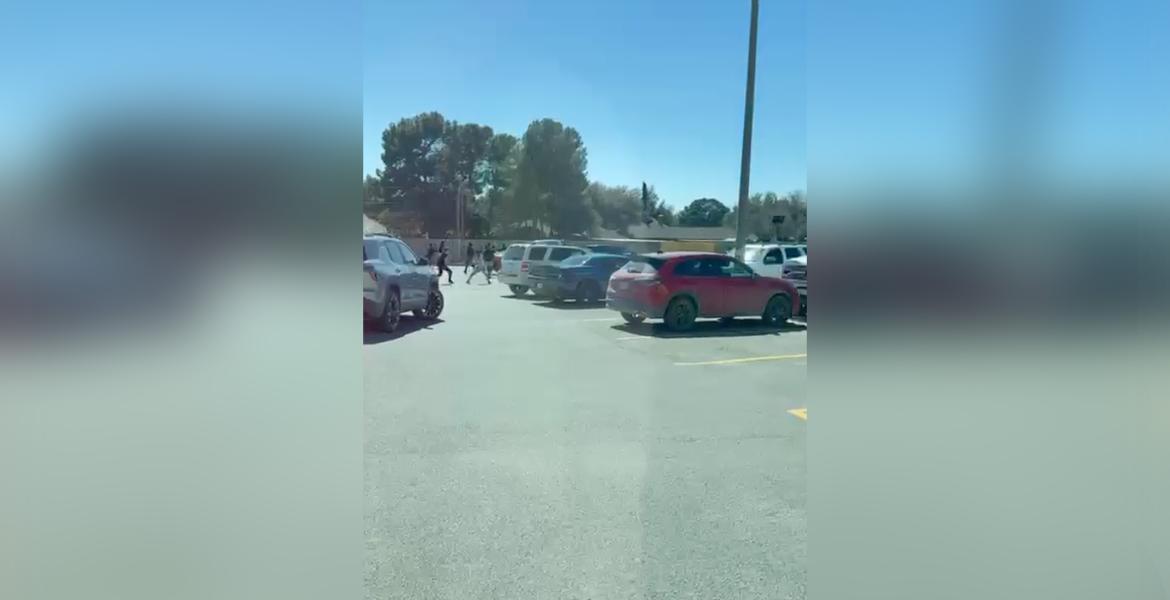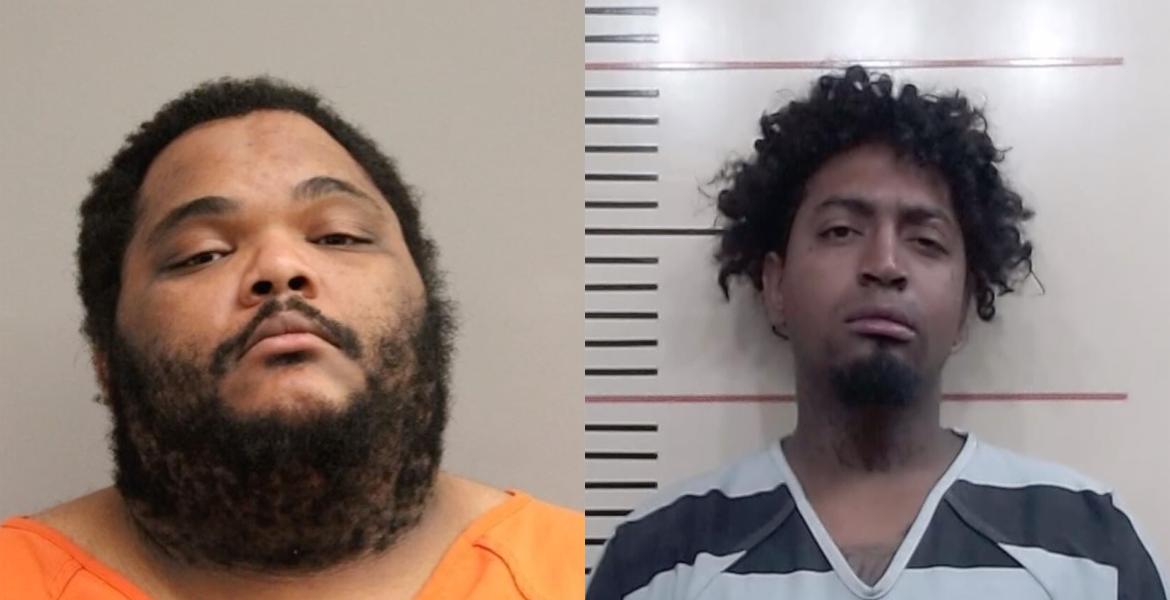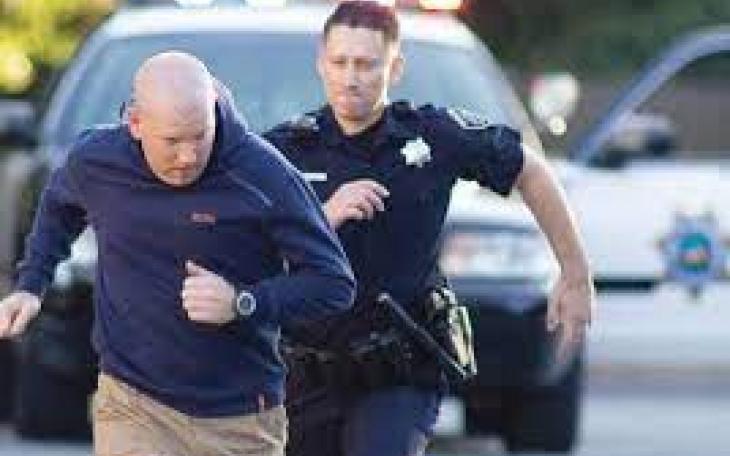"We’re so overwhelmed up here with cases sometimes it’s a shock to hear anything good," said James Hernandez, seated behind his desk in a small office upstairs in the police station with a stack files to his right and sticky notes pasted up here and there.
Hernandez is one of three detectives that cover the east side of the city, overseen by a supervisor he attributes a large portion of his success and driven by a desire to make his brother, a SAPD lieutenant, proud.
Following the lead of that same inspirational older brother, Mike Hernandez, James went into the Marine Corps in '89 and was working in telecommunications after he left the military, when geo-political forces pulled him back to the uniform.
“With 9/11 happening, it really hit home because I, myself, was stationed at the headquarters for the Marine Corps, maybe two miles away from the Pentagon,” Hernandez said. “I was there from about ’91-’93 in Washington, D.C. When 9/11 happened, it hit me real hard and I said, ‘you know what? I miss the uniform. I miss serving.’”
Hernandez said he had already done his time in the military and wasn’t really looking to go back, so he began thinking about a career in law enforcement, looking up to his older brother, Mike, who had already become an officer after leaving the Marines.
“I was living there in Buford, South Carolina, I applied with them, got on, and left in ’06, came back home. One day my older brother calls me, he says, ‘hey, mom thinks I’m her only son. Can you come back home? You’ve been gone a while.’ So I came back home.
Hernandez, a San Angelo native, left the city in 1989 to pursue a military career, and returned home in 2006 at the request of his brother. During his 17 years away from home, Hernandez traveled all over the United States and the Orient, spending a year stationed in places like Okinawa, Korea and the Philippines as a marine, and also up and down the U.S. east coast.
It was fun,” Hernandez said of the Orient. “It was something different to see. The culture—but you also see the political friction or stress between nationalist and the visiting country.
Of all he saw abroad, Hernandez ranked the beauty of Okinawa island at the top, mentioning that as a native west Texan, he hadn’t had much opportunity to see such a tropical landscape prior to deployment.
“I’d never been to Hawaii or anything like that, but Okinawa had definitely some beautiful sites to go sightseeing. If you weren’t working you’d go all over the place, different beaches. Each beach was different. You would think it’s the same around Okinawa island, but there was one beach…that was kind of rocky and then there was this white beach that was nothing but sand leading into the water. Different, beautiful sites out there. Great for hiking.”
While overseas, Hernandez served as a communications specialist. When he returned in ’91, however, technology was booming and he was afforded the opportunity to transfer to a new area as a small computer systems analyst.
At the time, his love for computers progressed to the point that he obtained his Microsoft Certified Systems Engineer certification, a certification that proved his proficiency in network communications.
Nowadays, Hernandez said, technology has evolved beyond his training in communications, and he’s not as savvy with new computers and systems as he is with the older dinosaurs. Still, the background has been helpful throughout his law enforcement career.
Having started out on patrol as all officers do, Hernandez decided to apply for a detective role at the encouragement of others in the department who were impressed with his work.
“There was a lot of detectives at the time that came down and spoke to me when an opening came up, and said, ‘We’ve reviewed some of your cases or we’ve worked some of your cases that you initially took. It didn’t require us to do a whole lot of investigating because you had everything. We think you would do awesome if you came up.’”
Hernandez said he was skeptical at first given the workload, but decided he’d give it a try and see how he fared.
“I loved it,” he said. “I love going to a scene and you have control. You know how things should run, but as a patrolman, you can’t say anything. As a detective, it’s your show.”
Hernandez credits a portion of his success on patrol to the training he received while at that small department in Buford, where CSI didn’t exist and he became a part of the National Criminal Enforcement Association.
Attending week- or two-week-long seminars every so often, Hernandez and officers from agencies all over the nation looked at new tools developed to find drugs and witnessed displays of seized cars with hidden compartments.
“I was new to law enforcement and I didn’t just want to do your usual: ‘The reason I pulled you over was because you were speeding,’” he said. “Now, through that training, I was looking at everything: middle console area, bottom of the floorboard, bulges in his pocket that look like a gun or something else. It just opens up your whole senses, everything.”
Back in Buford, Hernandez and the other officers in his small department received cross-training in crime scene development, whereas larger municipalities have entire divisions dedicated to those tasks.
“We didn’t have the luxury of a crime scene unit,” he said. “We had detectives that would come out and do their own foot molds or dusting for latent prints. We didn’t have that, so we were sent to class for lifting your own latent prints…what we look for, you know, ridges, points…I went to that class—we don’t have that here because we have our own crime scene unit to handle all that, but that spoils officers because they don’t know how to do certain things…”
Hernandez said the experience made him a better officer and pushed him to further investigate, which ultimately landed him in his current position as an SAPD detective.
The Never Ending Story
On any given day, each San Angelo detective may be working between 15 and 40 cases. Hernandez said he’s seen it get as high as 60 cases before for one detective, but that it varies and that they each receive an average of eight new cases per week.
“Some of these cases you can enact because you have nothing left to investigate, but all of a sudden someone will call you or more evidence comes back from that last case that you closed, you’ve already enacted it, but now you have to bring it back out and work on it because new evidence surfaced,” he said.
Hernandez estimates he generally maintains about 20 cases at a time, and works multiple at a time depending on what evidence is available. It can become difficult to keep all the facts straight, he said, especially in cases where the MO or crime committed is similar to another, so attention to detail and compartmentalizing is crucial.
Deciding what to work on is up to each detective individually, Hernandez said, and his decisions are based on what’s available at the moment.
Even at home, he said, he’s always thinking. “There’s so much I’ve go to do tomorrow. I have two cases I need subpoenas for so I can submit them to banks so they can give me their records. I’ve got this aggravated assault where a lady was assaulted and I need to take pictures of her tomorrow morning. You’re always thinking, you don’t know. But if it’s fresh and you’ve got evidence—enough to get a warrant—then you work on those.”
Providing example, Hernandez described a break-in where the victim has no idea who may have committed the crime and there were no suspects. He said it is unlikely he will wake up and go knocking on doors to ask neighbors if they saw anything, when at the same time he’s got cases with mounting probable cause and he could go seek a warrant.
“It’s not just talking to people,” he said. “We’re really [doing] a lot of administrative duties. If you talk to someone, what do you have to do? Come back over here, type it in exactly what they said and whatnot. There’s a lot to it. It’s not just going out there and being the detective. A lot of what we do is right here,” he said, turning toward his computer.
Hernandez estimates that he spends 65 percent of his time typing up witness statements, writing affidavits, sending out subpoenas and doing other administrative work the law requires in criminal cases.
He and the other detectives work 10-hour days, and despite having each a heavy caseload, often assist one another in collecting statements and visiting suspects, where it may not be safe to go alone.
Seeing the Bad
Throughout their careers, law enforcement officers are continually confronted with death, violence, drug use and negativity. Hernandez has seen his share over he past 14 years, but says he’s been most effected by a local case involving a marine that died after two drunks pushed a truck into a dark road and he slammed into the side of it.
“One of the ones that bothered me the most was the Di Pietro case,” Hernandez said. “What was more touching was the fact that he was a marine, and of course, I’m real partial to marines, being an ex-marine myself. And it was needless. It was caused by two individuals who were intoxicated and who were not thinking.”
Hernandez said Di Pietro’s mother recently came down to the PD to thank him for the work he had done on the case, which meant a lot to the detective.
“You could tell she was still trying to hold it together,” he said. “No one will know—unless you’re a police officer—how many times you go to a scene, vehicle accidents, and see death.”
Hernandez recalled holding another marine’s hand at the scene of a crash and telling him help was coming, then watching the man draw his last breath.
“When that happens, it kind of spooks you,” he said. “You move on, try to isolate it, get it out of the way, out of your mind, but then you keep on going to theses scenes and seeing this over and over again. It takes its toll; it does.”
In order to deal with the constant exposure to death and violence, detective Hernandez said he turns to jokes, which can sometimes be a bit crude, which help him vocalize what’s on his mind.
“It’s there, that’s why you said it, and it just helps you release it for that moment,” he explained.
If there’s no one around to joke with, Hernandez said, you just deal with it. “Time will heal,” he said, and sometimes work or other things will take your mind off of it.
Despite the negativity, Hernandez said law enforcement is his calling, and he loves putting on the gun and the badge each morning and heading into work.
“It’s a rewarding job…you know it has to be done and you know you’re helping people,” he said.
Recognition
Regardless of the impact of helping people, every day a detective walks into his office and is greeted by a new stack of cases on his desk. Detective Hernandez had at one time the highest closure rate in the entire division, and has consistently managed a very high caseload, senior officers said.
For his hard work and dedication, Hernandez was named the department’s Officer of the Month for February.
“I have a very strong supervisor, and I’ll give him some credit on that,” Hernandez said. “…because my brother has been here for a while and his rank, I wouldn’t want to disappoint him. ‘How can Lt. Hernandez be so good and detective Hernandez, he isn’t worth a damn…well, if I was sorry or I was no good, I wouldn’t be up here. They would have sent me back to patrol by now. I’m here for a reason.”
(Eds. note. At the request of the SAPD, comments have been turned off for this story.)
Subscribe to the LIVE! Daily
Required






Post a comment to this article here: